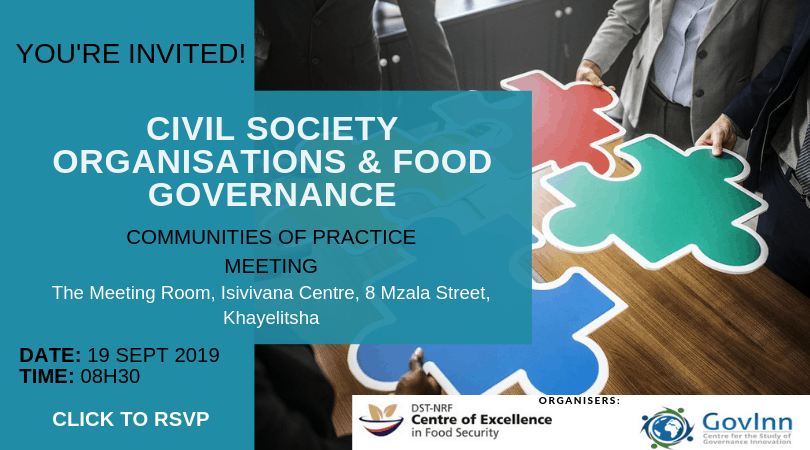Time: 08h30 - 13h00
Venue: The Meeting Room, Isivivana Centre, 8 Mzala Street, Khayelitsha
19 September 2019
This Food Governance Community of Practice meeting will explore the role of Civil Society Organisations (CSOs) in food governance in the Western Cape.
An increasing number of civil society organisations are active in the food space in the Western Cape and their involvement in food governance takes a variety of forms. Some organisations are making practical interventions through projects and programmes on the ground, whilst other organisations embark on advocacy campaigns.
This meeting will attempt to identify some of these CSOs, unpack how their work relates to food and also gauge the level of connections (actual and potential) between the groups. We will ask the question, does Cape Town (yet) have a recognisable ‘food movement’? Such a movement could significantly affect food governance in two ways: 1) By placing pressure on the government to realise the right to food in the Constitution; and 2) Participating in collaborative governance structures to take an equal role alongside other actors in government, academia and the private sector.
A draft programme of the meeting can be found HERE.
Please click HERE to RSVP
For more information please contact: camilla.adelle@up.ac.za 083 260 4703
Upcoming Events
Our GOALS
We recognise that producers, processors, distributors and consumers are incorporated into the food system under varying terms and returns. We also recognise the economic, social, human and environmental health impacts associated with food security. Therefore our goal is to conduct research, build capacity and disseminate findings that will promote a sustainable food system in South Africa.
Our MISSION
Our research is concerned with the scale, nature, causes and consequences of food insecurity in South Africa and elsewhere on the African continent. Thus our mission is to investigate products, technologies, processes and policies that can reduce food insecurity and mitigate its negative outcomes. We seek to make a difference to food security by linking innovative science with critical enquiry.




